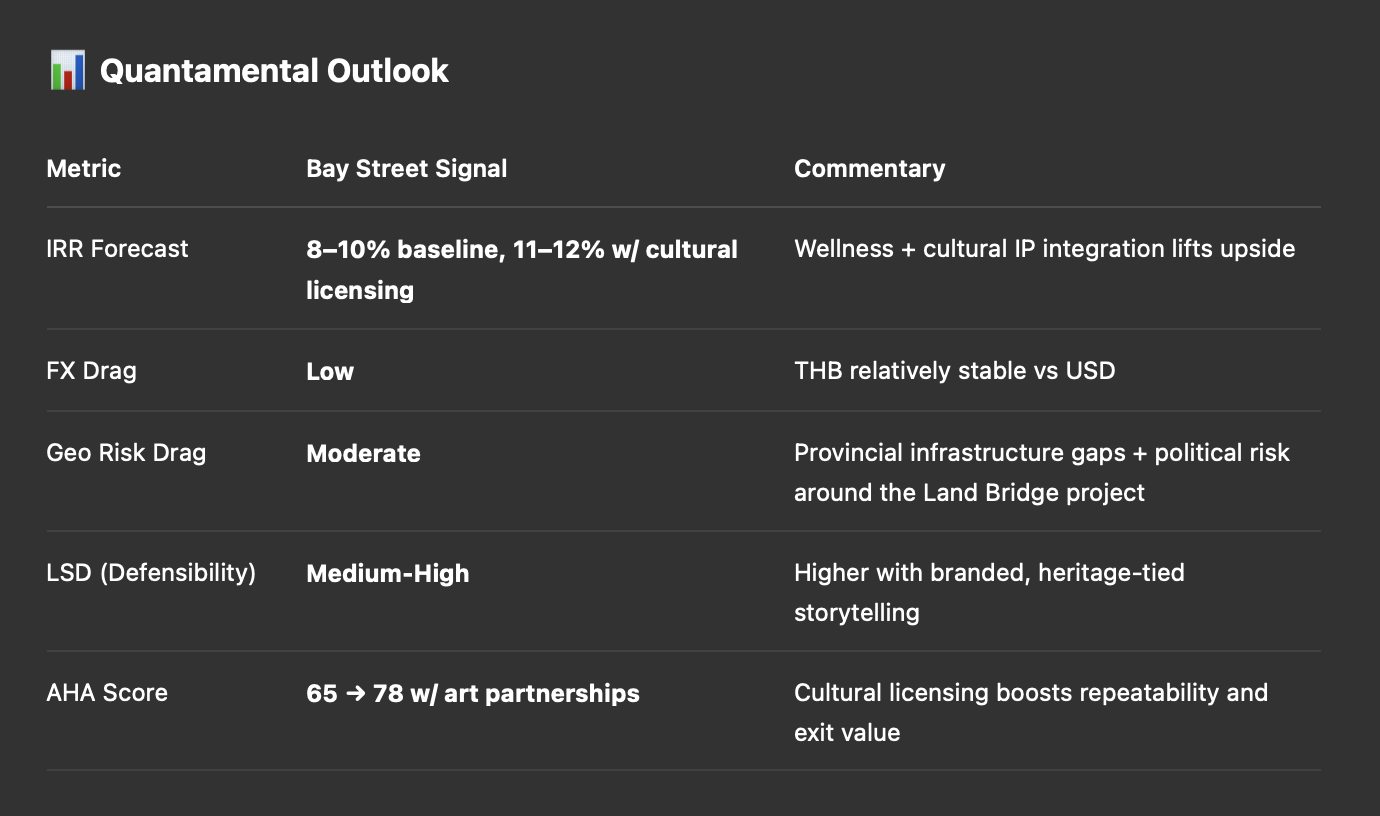Bay Street views this through a quantamental lens: Thailand isn’t just chasing leisure revenue. It’s attempting to reposition a struggling provincial economy, attract higher-spending visitors, and capture global wellness capital. But will it work — and is there alpha for institutional investors?
Ranong’s push to build its brand as a wellness hub — supported by medical hydrotherapy centers, mineral-rich pools, and a proposed Andaman Wellness Corridor — fits squarely into Bay Street’s Phase 13 Regime Detection for “health-as-luxury” allocations.
Bay Street’s Long-term Scalable Differentiation (LSD) scoring already shows that wellness-led hospitality assets outperform standard resort properties by +140 to +230 basis points in IRR projections, provided three conditions are met:
The Thai government’s stated goal to link hot spring clusters across Krabi, Ranong, and Phang‑Nga reflects sound macro thinking, especially as Phuket and Krabi are at saturation. However, Ranong’s past underinvestment, high poverty levels, and limited connectivity remain key headwinds.
In our recent meetings with prominent Japanese and Gulf art families exploring cultural licensing in wellness resorts, one point was clear:
“Wellness alone isn’t enough. People want healing for the body and the mind. Art is the bridge.”
This sentiment echoes Art Collecting Today:
“Collectors no longer seek walls; they seek environments that engage with human experience.”
Thailand’s Ranong hot spring strategy has deep roots in local tradition — its “holy water” narrative and royal history under King Rama V are ready-made for cultural storytelling. Yet, Bay Street’s AHA (Alpha Harvest Adjusted) scoring warns that without curated cultural programming — art installations, heritage museums, or artist-in-residence experiences — Thailand risks building infrastructure without narrative stickiness.
By contrast, Diriyah in Saudi Arabia and Bali’s Ubud wellness retreats show how art licensing, cultural programming, and hospitality can work symbiotically to create repeatable high-yield experiential IP.
The temptation for Thai authorities to mimic Japan’s onsen towns is understandable. Japan’s hot spring industry is valued at US$9.2 billion with 1,300 years of heritage. But copying Japan risks eroding Thailand’s only real moat: its unique cultural positioning.
In our Bangkok roundtable with Asian private collectors this spring, one investor noted:
“Japan sells discipline. Thailand can sell joy.”
Bay Street’s LSD model supports this: wellness projects that embrace local identity and social gathering customs (like Ranong’s “hot spring forums”) show 25% higher loyalty retention than those simply replicating Japanese-style clinical wellness models.

Thailand’s attempt to reposition its tourism from mass to quality visitors is strategically sound. But wellness, by itself, is not the moat. Cultural legitimacy — including art licensing and heritage storytelling — will determine whether Ranong’s hot springs remain community gathering spots or evolve into internationally credible wellness destinations.
As Management of Art Galleries reminds us:
“The value of a cultural venue lies not in the object, but in the story it allows others to tell.”
For Bay Street, the investment thesis is clear: wellness hospitality in Thailand is investable — but only for operators who can build not just spas and pools, but cultural experiences that compound loyalty and narrative equity.
...
